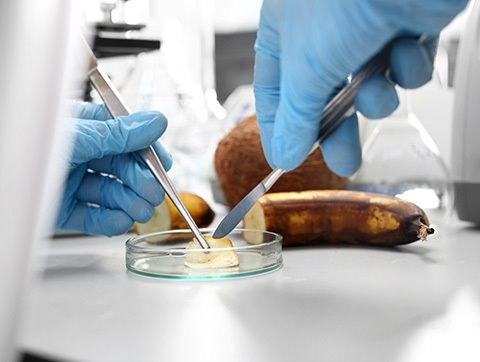About Food Science and Technology

To help consumers make informed decisions about the food they eat, IFT has developed IFT Food Facts to provide consumers with news they can use in their daily lives.
What is Food Science?
- Food science is the study of the physical, biological, and chemical makeup of food; the causes of food deterioration; and the concepts underlying food processing.
- Food scientists and technologists apply scientific disciplines including chemistry, engineering, microbiology, and nutrition to the study of food to improve the safety, nutrition, wholesomeness and availability of food.
- Depending on their area of specialization, food scientists may develop ways to process, preserve, package, and/or store food according to industry and government specifications and regulations.
What is Food Technology?
- Food technology is the application of food science to the selection, preservation, processing, packaging, distribution, and use of safe food.
- Related fields include analytical chemistry, biotechnology, engineering, nutrition, quality control, and food safety management.
What is Food Processing and Manufacturing?
- Food processing is the treatment of food substances by changing their properties to preserve it, improve its quality or make it functionally more useful.
- Food processors take raw animal, vegetable, or marine materials and transform them into edible products through the application of labor, machinery, energy, and scientific knowledge.
- Chemical, biological, and mechanical processes are used to convert relatively bulky, perishable, and typically inedible food materials into shelf-stable, convenient, and palatable foods and beverages.
- Food processing is one of the largest manufacturing industries in the United States.
- According to the FDA, there are approximately 44,000 food processors and 113,000 food warehouses in the U.S. that provide processed foods to our country, and exports throughout the world. The processors include canners, producers, wineries, and other food and beverage manufacturers and distributors.
- There are more than 1.2 million retail food facilities (restaurants, grocery stores, and others) that serve or sell foods directly to consumers.
What is Food Research?
Food research is the careful, systematic study, investigation, and compilation of information about foods and their components.
What is Food Manufacturing? Food manufacturing is the mass production of food products from raw animal and plant materials, using principles of food technology.
What is Product Development?
Product development is the creation of new flavors, colors or varieties of existing products and/or the creation of entirely new products.
What is Quality Assurance and Quality Control?
Both quality assurance and quality control involve the process of ensuring that products are manufactured correctly and that ingredients and finished products are tested and meet safety and quality specifications.
What is Food Regulation?
Food regulation is the process of determining standards for products, defining safety, and inspecting products. Regulations are set by governments.
IFTNEXT

Episode 33: Global Food System Challenge Growth Grant Winners
Join us to celebrate the Global Food System Challenge Growth Grant Winners. Representatives from Food Systems for the Future (FSF Institute), iDE Global, and the African Center for Technology Studies discuss their work and the role that the generous funding from Seeding The Future Foundation plays in helping to make healthier diets more accessible and empowers consumers to make choices benefitting both personal and planetary health.

Episode 32: Global Food System Challenge Grand Prize Winners
Join us to celebrate the Global Food System Challenge Grand Prize Winners. Representatives from the International Rice Research Institute, Solar Freeze, and WorldFish discuss their work and the role that the generous funding from Seeding The Future Foundation plays in helping to make healthier diets more accessible and empowers consumers to make choices benefitting both personal and planetary health.
